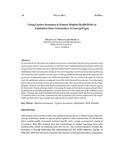Please use this identifier to cite or link to this item:
https://cris.library.msu.ac.zw//handle/11408/741Full metadata record
| DC Field | Value | Language |
|---|---|---|
| dc.contributor.author | Masiyiwa, S. | - |
| dc.contributor.author | Makaza, F. | - |
| dc.contributor.author | Marufu, A. | - |
| dc.date.accessioned | 2015-12-04T11:10:45Z | - |
| dc.date.available | 2015-12-04T11:10:45Z | - |
| dc.date.issued | 2012 | - |
| dc.identifier.issn | 1815-9036 | - |
| dc.identifier.uri | http://hdl.handle.net/11408/741 | - |
| dc.description.abstract | Universities all over the world view medical insurance as a critical aspect that any caring institution needs to put in place upfront. State universities in Zimbabwe have traditionally financed student health risks using commercial medical insurance. Both the students and the institutions of higher learning have also traditionally relied on funding from the fiscus. The current liquidity crunch the economy is facing following the introduction of the multiple currency regime in February 2009 has adversely affected the capacity of the government to adequately support the institutions financially. The current financial support to students under the cadetship programme is inadequate to meet the tuition fees and living expenses. Currently student health risks are financed by commercial medical aid societies who charge $30 per semester for their basic packages. Students must show proof that they have paid for their medical insurance before they can register for the semester. This fee, although modest, is increasing the burden of the students as salaries of most of their guardians who are formally employed have remained very low since the introduction of the multiple currency system. This paper discusses the limitations of medical aid societies as a student health risk financing mechanism in Zimbabwe state universities. It also alerts the state universities of the existence of alternative risk transfer (ART) solutions which they can adopt and implement for the benefit of their students. | en_US |
| dc.language.iso | en | en_US |
| dc.publisher | Midlands State University | en_US |
| dc.relation.ispartofseries | The Dyke;Vol. 6; No. 3; p.36-47 | - |
| dc.subject | Medical insurance, captive insurance | en_US |
| dc.subject | Alternative Risk Transfer. | en_US |
| dc.title | Using captive insurance to finance student health risks in Zimbabwe state universities: a concept paper | en_US |
| dc.type | Article | en_US |
| item.fulltext | With Fulltext | - |
| item.grantfulltext | open | - |
| item.openairecristype | http://purl.org/coar/resource_type/c_18cf | - |
| item.openairetype | Article | - |
| item.cerifentitytype | Publications | - |
| item.languageiso639-1 | en | - |
| Appears in Collections: | Research Papers | |
Page view(s)
258
checked on Dec 30, 2025
Download(s)
314
checked on Dec 30, 2025
Google ScholarTM
Check
Items in MSUIR are protected by copyright, with all rights reserved, unless otherwise indicated.




